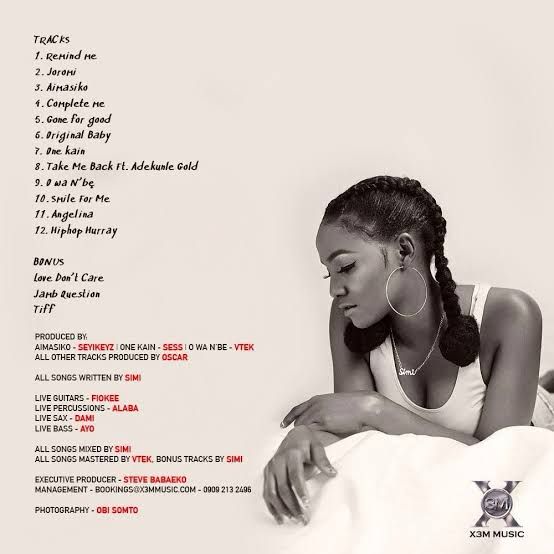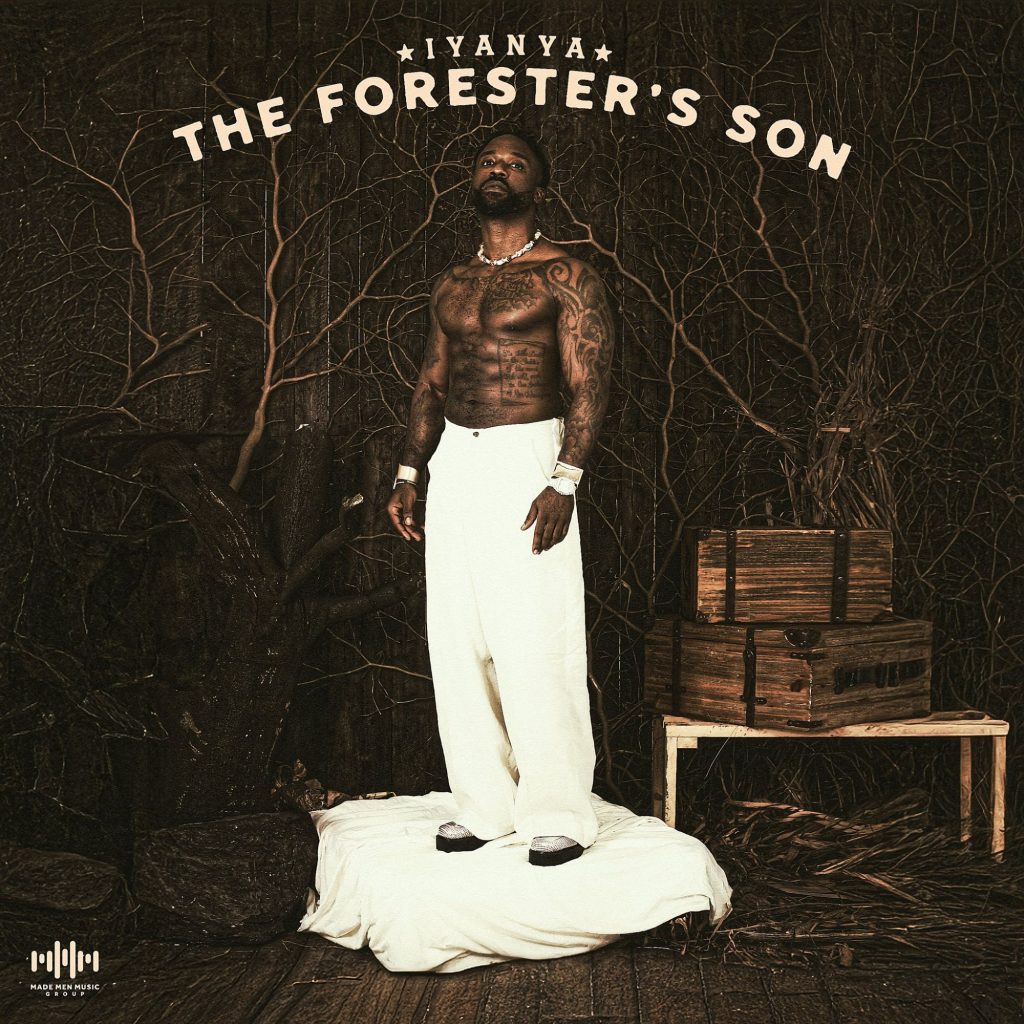When Simisola Kosoko (née Ogunleye) released her debut album Ogaju in 2008, she was nowhere close to being a household name in the Nigerian music industry. She was also a gospel artist, yet to craft a solid artistic identity for herself.
The early 2010s came with more clarity, with the release of the singles ‘Tiff’ in 2014 and ‘Jamb Question’ in 2015. There was more than enough room for one more female force in the industry, and Simi’s folk leanings set her apart with ease.
Having struck an adorable artistic match with then-rising rapper Falz, which began with his appearance in the ‘Jamb Question’ music video and culminated in the 2016 joint album Chemistry, it was only proper for Simi to set the record straight on a solo basis. The outcome of this endeavour is 2017’s Simisola, an emphatic reintroduction to a unique voice that had gestated in the background for years, and an artistic reboot like no other. Indeed, Simisola is Simi’s true debut.

The original version album, clocking in at twelve tracks and three bonus tracks, chiefly explores the different facets of love, as well as identity, humanity, and the urban experience. Oscar takes the predominant production reins, with contributions from Seyikeyz, Sess and Vtek also elevating this unique blend.

On ‘Remind Me’, piano riffs usher in the listener to the musings of a conflicted soul seeking to extend humanity beyond friends and family members. On a macro level, the mellow track does well to set the sonic and thematic tone for the album. Simi then leans into the thrill of latent affection on the upbeat ‘Joromi’, beckoning to her aloof object of affection to act accordingly. This is humorous, considering the lack of a formal approach (‘I dey give you signal (Joromi)‘/’Why you no dey see me ah (Joromi)‘/’I give you green light tire (Joromi Joro)‘). The title references Sir Victor Uwaifo’s iconic 1960s track, ‘Joromi’ – a seemingly harmless move that nearly birthed a lawsuit.
Things go up ten notches higher with bass drums on the inspirational, gospel themed ‘Aimasiko’. Here, Simi speaks to downcast hearts feeling divine abandonment, encouraging them to maintain their faith in God and a better tomorrow. Taking a step further from ‘Joromi’, Simi incorporates lyrics from Chief Ebenezer Obey’s track of the same name. To more seasoned ears, these homages are indicative of Simi’s efforts to appeal to multiple generations of Nigerian listeners.
Simi dwells on the joys of love at its peak, coasting on talking drums in ‘Complete Me’ (‘Oh, oh, no, I never thought‘/’Thought that I could love anybody‘/’The way that I love you so completely‘). To drive home the feeling of completeness she enjoys, she likens life without her lover to a night sky without stars, faith without belief and a heart without a beat.
With solemn piano riffs, things take a sharp and forlorn turn on ‘Gone For Good’, where Simi cynically addresses an old love interest seeking to undo her healing by proposing a reopening of the closed chapter. It is easy to tell that this chapter ended on a bitter note. The new development is hard for her, considering the affection that lingers (‘And I thought I moved on’/’But now I really doubt it, I do’; But oh, if I set my eyes on you’/’It’s unavoidable, I’ll come undone‘). It stands as one of the album’s finest and most nuanced tracks.
A saxophone throughline takes the baton from the piano on ‘Original Baby’, where Simi drives home the message of uniqueness in a world filled with the endless pressure to fit in (‘Everything’s not for everyone and that is okay, eh-eh‘/‘You better take me as I am‘/’I’d be better, but I’d never be somebody else‘). Simi explores the thrill of latent affection again on ‘One Kain’, specifically one brewing unexpectedly from a platonic friendship. Unlike ‘Joromi’, there’s a sense of reciprocity here.
Asides a 2Baba feature on the deluxe edition, Simisola features one guest appearance: her partner and eventual husband, Adekunle Gold. He lends his vocals to ‘Take Me Back’—a track that flips the resistance on ‘Gone For Good’, with Simi making an earnest plea for her lover to take her back. Interestingly, Adekunle tows a loosely similar line with Simi on ‘Gone For Good’ by reluctantly responding to the proposal. They affectionately refer to themselves as Kunle and Tito—Tito being the shortened version of Simi’s middle name, Bolatito. All’s well that ends well, as Adekunle Gold gives into Simi’s plea.
The ninth track, ‘O Wa N’be’ is a love letter to the highlife-fueled Saturday parties that play out in Lagos. She references archetypal Nigerian party goers, whom Yoruba-speaking listeners can instantly relate to. While almost entirely delivered in Yoruba, there is ample enjoyment to be had for unfamiliar ears.
‘Smile For Me’, the track with which Simi formally commenced her album march with, follows. Seeped in Yoruba percussions and instrumentals, Simi calls on her lover to go out of their way to make her happy and strengthen the bond between them, even under less ideal circumstances. She notably sings, ‘I, I, I want to be the one who makes you do the things you thought you’d never do‘.
As the album winds down, Simi humorously explores the theme of infidelity on the resonant ‘Angelina’. Having endured her partner’s chronic infidelity for long, she finally reaches a breaking point (‘Wetin my eye see with Angelina’/’I no wan see am again‘). With ‘Hiphop Hurray’, Simi alludes to the Naughty By Nature track and beckons to the listener to groove on a mid-tempo carousel.
‘Love Don’t Care’, ‘Jamb Question’ and ‘Tiff’, Simi’s breakout singles from 2016, 2015 and 2014 respectively, as well as a 2Baba-aided remix of ‘Original Baby’, close out the album as bonus features. A Sigag Lauren remix of ‘Smile For Me’ additionally features in the deluxe version.
Overall, Simisola is a fine blend of traditional instruments and contemporary soundscapes. The lyrics are earnest, resonant and easy to follow. There are no outright pop bangers on this project, making it an ideal listen for conservative and introspective ears. One may argue that Simisola benefited from the relative paucity of Nigerian albums in 2017. However, there is no era in Nigerian music where a similar release with sufficient marketing would not find a sizeable audience.
There have been three more Simi releases: 2019’s Omo Charlie Champagne album, 2020’s Restless II EP and 2022’s To Be Honest. For all the moments, experimentation and positives of these projects, Simisola remains Simi’s undisputed essential project.






